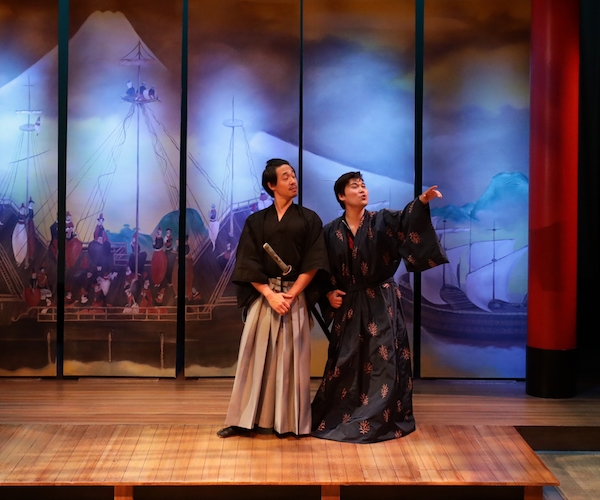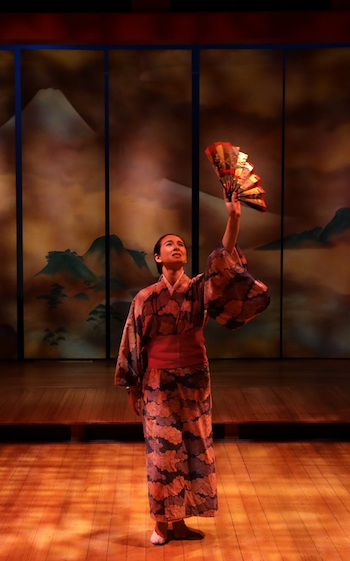Theater Review: “Pacific Overtures” — A Civilization on the Brink of Change
By Evelyn Rosenthal
Pacific Overtures offers a history lesson — but it is an entertaining, moving, thought-provoking, and timely one.
Pacific Overtures. Music and lyrics by Stephen Sondheim. Book by John Weidman. Directed by Spiro Veloudos. Music director, Jonathan Goldberg. Choreography by Micheline Wu. Scenic design by Janie E. Howland. Costume design by Gail Astrid Buckley. Produced by the Lyric Stage Company of Boston, 140 Clarendon Street, 2nd floor, Boston, MA, through June 16.

Carl Hsu and Sam Hamashima in the Lyric Stage production of “Pacific Overtures.” Photo: Mark S. Howard.
Over the past 20 years, the Lyric Stage has presented 10 works by Broadway great Stephen Sondheim, including one in each of the last six seasons. From 2013–14 through now Boston audiences have been treated to strong productions of Into the Woods, Sweeney Todd, Sondheim on Sondheim, Road Show and Company (the only one I didn’t manage to see). Producing artistic director Spiro Veloudos now brings his ambitious run of Sondheim musicals to a close—or maybe just a pause—with an excellent production of the rarely performed Pacific Overtures.
The three shows Sondheim did with book writer John Weidman all deal with actual events. While Assassins and Road Show focus on a few historical figures, though, Pacific Overtures imagines a seminal, world-shaping period: US Commodore Matthew C. Perry’s 1853 “gunboat diplomacy” mission to open up Japan to trade with the West, and the country’s subsequent rise to the status of a world power.
If that sounds like a history lesson, well, it is—but an entertaining, moving, thought-provoking, and timely one. In 1853, President Millard Fillmore sent Perry to make Japan an offer it couldn’t refuse—open up their isolationist country to trade with the US or face invasion. It’s hard to miss the resonances with today’s news of the current American president’s trade wars, especially with China. Weidman, who majored in East Asian studies at Harvard, makes the historical clashes—between East and West as well as Japan’s internal cultural and class struggles—compelling by placing the characters of Kayama, a lesser official and samurai, and Manjiro, a fisherman, at the center of both confrontations.
A narrator—known as the Reciter—helpfully fills in background for those who aren’t up on their Japanese political history: the powerful shogun runs the country; the emperor plays a largely ceremonial role; for two and a half centuries Japan allowed very little trade and minimal contact with the outside world. The changeless nature of this “floating world” is evoked by Janie E. Howland’s lovely set—cherry branches overhead, a house walled with painted screens that can be flipped to change the scene—and comes to vibrant life in the fluidly choreographed opening number, “The Advantages of Floating in the Middle of the Sea.”

Micheline Wu in the the Lyric Stage production of “Pacific Overtures.” Photo: Mark S. Howard.
Into this more or less peaceful world comes trouble: Manjiro, a fisherman who years before was picked up by an American ship and brought to Boston, has returned to warn his countrymen about Perry’s plans. Under suspicion because of his Western clothing, he is captured and brought before Lord Abe, the First Councilor to the Shogun. The wily Abe promotes a lowly samurai, Kayama, and sends him to order the ships to leave—which, of course, doesn’t work. Kayama requests the prisoner’s help in dealing with the Americans, and together the two come up with a convoluted plan to allow Perry to deliver his letter from the US president while keeping the foreigners from stepping onto Japanese soil. And that’s just the first act.
The choices Veloudos has made beautifully convey the show’s complex story in the intimate Lyric setting. The original Broadway production heavily emphasized the stylized elements of Kabuki theater, its cast of 22 featuring men in most of the female roles. Veloudos’s terrific all-Asian cast of 11 includes a number of women—significantly, the wonderful Lisa Yuen as the Reciter, and the show’s talented choreographer, Micheline Wu, as Kayama’s wife Tamate. Wu shines in one of the most affecting scenes, as she anguishes over the possibility that her husband’s mission will fail and they will both have to kill themselves out of shame. Two “observers” sing the spare, haunting “There Is No Other Way”—one singing about Tamate, the other voicing her words and thoughts—while Wu dances the story to the sounds of flute, percussion, and piano. Here the decision to cast women for many of the female roles—Karina Wen and Elaine Hom play the two observers—seems particularly effective, adding poignancy to the character of Tamate and her fate, which might have felt less immediate and affecting through the more stylized Kabuki lens.
Though less well known than other Sondheim scores, Pacific Overtures is full of his signature sharp, witty lyrics, and a variety of musical styles perfectly designed to reflect each element of the story. The dramatic “Four Black Dragons” conveys the terror at the sight of Perry’s ships heading for shore; in the alternately minimalist and lush “Poems,” Manjiro and Kayama—played by Sam Hamashima and Carl Hsu, each displaying terrific voices—pass the time on a journey and solidify their friendship by trading verses; for the rousing “Please Hello,” Sondheim brilliantly recycles the Sousa march, the can-can, the Gilbert & Sullivan patter song, and the Russian folk dance, as admirals from various Western countries make their case for trade and “détente.” The trim, four-piece orchestra, under the direction of Jonathan Goldberg, more than does justice to Sondheim’s eclectic score.
Pacific Overtures is a rich work, tackling large themes like imperialism and modernization while drawing a picture of a civilization on the brink of change through the sung stories of characters high and low—shogun and emperor, fisherman and samurai, sailor and admiral, geisha and merchant and thief. In this beautifully designed and performed production, Veloudos and the Lyric Stage have capped off their Sondheim project with a winner.
Evelyn Rosenthal is a singer specializing in jazz and Brazilian music, a freelance editor, and the former editor in chief and head of publications at the Harvard Art Museums. She writes about musical theater and music for the Arts Fuse.
